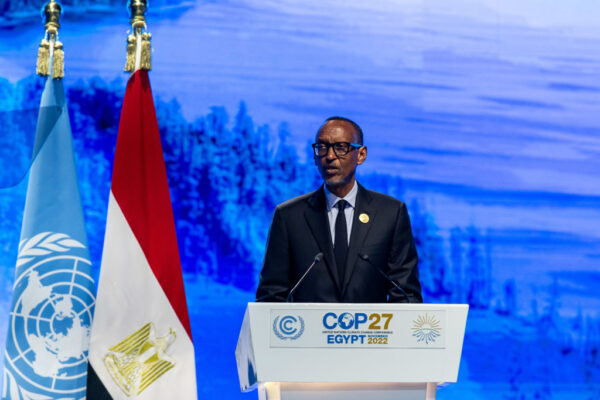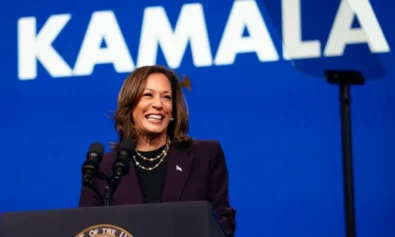Rwanda President Paul Kagame said the U.S. has to invade the African nation if officials want a man currently serving time in his country’s prison freed.
President Biden’s administration and human rights activists have called on Kagame to release Paul Rusesabagina, a direct political opponent of the president and the inspiration behind the award-winning movie, “Hotel Rwanda,” which highlights his heroic efforts in the genocide of 1994.

The U.S. and human rights activists purport that Rusesabagina is wrongfully detained. He was convicted in September 2020 of leading a terrorist group responsible for attacks against Rwanda and sentenced to 25 years in prison. U.S. Secretary of State Antony J. Blinken has pressured the president to release Rusesabagina, who received the Presidential Medal of Freedom from George W. Bush in 2005. However, Rwanda refuses.
“We’ve made it clear there isn’t anybody going to come from anywhere to bully us into something to do with our lives and works,” Kagame said during an interview at the U.S.-Africa Leaders Summit in mid-December. “And maybe make an invasion and overrun the country. You can do that.”
Rusesabagina’s lawyers and his family argued the charges were retaliation for his opposition against Kagame, who has led the country since 2000. Critics of the longtime president have accused him of authoritarianism. Reports claim Rusesabagina got on Kagame’s radar after he published a memoir in 2006 in which he criticized the president.
Rusesabagina said he was tricked into leaving Texas, where he had received permanent resident status, after reportedly facing threats and home intrusions in Belgium where he was a citizen. U.S. Rep Joaquin Castro has also lobbied for his release, pushing legislation through Congress.
Rusesabagina has been internationally hailed as a hero for using his position as manager of Hotel des Mille Collines to save 1,268 people, mostly Tutsis, who had been facing persecution under Hutus power. Kagame, a Tutsi, has been attributed with helping end the genocide as a former military officer and vice president.
Under Kagame, Rwandans have rated the government exceptionally high, according to Gallup data. Still, they have rated their quality of life low, even though GDP, school enrollment, child mortality and life expectancy have all substantially improved under the president. Gallup CEO Jon Clifton believes the unbalanced results are due to a lack of democracy.
In 2017 Kagame was reelected for a second time with 99 percent of the vote, leading to skepticism. He also has faced other accusations of ordering the murder of some of his exiled opponents.
Kagame, known for calling out the West for encroaching on African sovereignty, has dismissed all the claims and blamed the assumptions about his rule on outsiders looking in and Western influence on the polling.
Kagame and his administration accused Rusesabagina of exaggerating his role during the genocide and helping rebels. In August 2020, Rusesabagina flew from Dubai after an invitation from an old friend to speak at churches in a country neighboring Rwanda. Instead of landing in the adjacent nation, however, the private jet landed in Rwanda’s capital, where Rusesabagina was tied up, blindfolded and arrested, The New York Times reports.
Rusesabagina’s terrorist charges stem from his leadership in the Rwanda Movement for Democratic Change, which is accused of being responsible for attacks that killed nine people in 2018. Rusesabagina has not denied being affiliated with the group but disputes being involved in the attacks. His lawyers claim that his rights to confidential communications and other judicial freedoms were violated during his trial.
Activists who created a petition for his release and sent a letter to President Joe Biden said the medal of honor recipient was tortured for three days after his arrest. They claim he had no access to a lawyer of his choosing for over 70 days, the Rwandan Bar Association denied his request for international lawyers, and Kagame pre-judged his guilt in a public press conference.
Blinken contended in an August press conference with Rwandan Foreign Minister Vincent Biruta that Rusesabagina is a lawful permanent U.S. resident who wasn’t granted a fair trial. He also spoke to Kagame about the man’s release.
“We continue to urge the government to address our concerns about the legal protections afforded to him in his case and establish safeguards to prevent similar outcomes in the future,” Blinken said.
However, Biruta argued that Rusesabagina is a Rwandan citizen and his conviction was lawful under Rwandan and international laws, with 20 co-defendants also found guilty. Some confessed to the crimes.
“Therefore, Rwanda will continue to abide by our rules and the decisions that were made by our judiciary,” Biruta said. “And we request our partners to respect Rwanda’s sovereignty, Rwanda’s laws, and its institutions. That’s what I can state about your question on Rusesabagina.”
The president echoed the same sentiment during the interview at the summit held from Dec. 7 through Dec. 16.
“The case is very clear. It has gone through the courts of law with due process. The evidence, facts about the case were presented in the open. The history of that has also been clear,” Kagame said.
The president added that he is concerned that if Rusesabagina is released, questions about exonerating the other 20 defendants will arise. He also accused Blinken of highlighting the man’s status as a “celebrity” or “famous” person.
“If we are going to be dealing with our problems in this manner that the one associated with somebody who is powerful will not be held accountable, but the rest would be held accountable,” he added.


